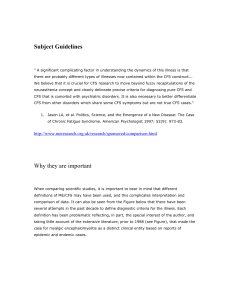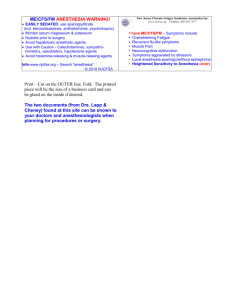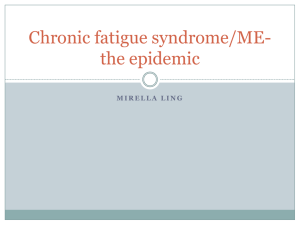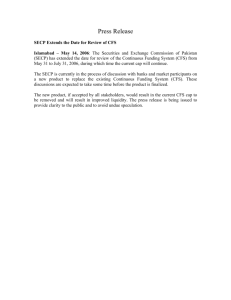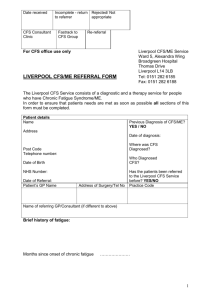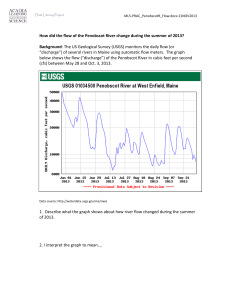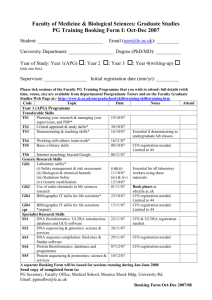Chronic Fatigue Syndrome
advertisement
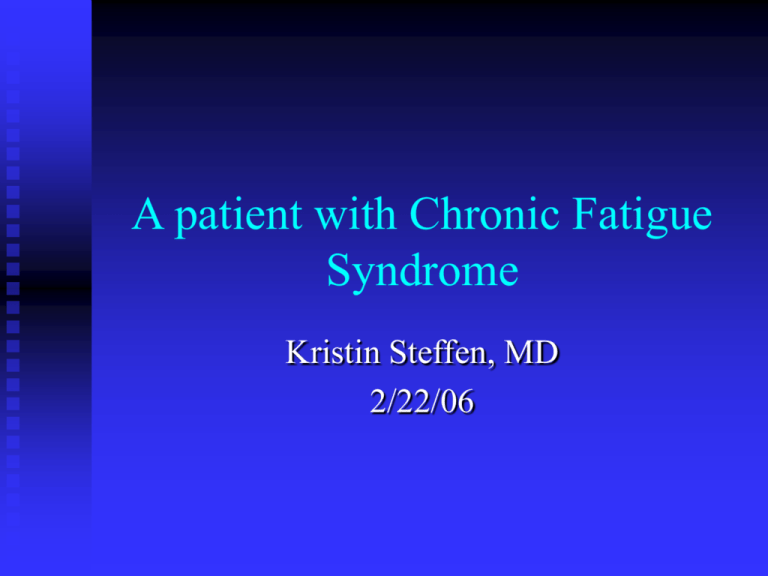
A patient with Chronic Fatigue Syndrome Kristin Steffen, MD 2/22/06 I have no financial disclosures. Objectives Identify case definition for Chronic Fatigue Syndrome (CFS) Recognize similarities between CFS and fibromyalgia Describe clinical presentation, prognosis of CFS Review recommendations for diagnosis Identify 2 treatments Identify useful references Informational presentation only (I am not soliciting referrals!!) Case of AF AF is a 35 yo F diagnosed with CFS in 1992 with abrupt onset of symptoms following URI Extensive negative work up for alternative cause (>14 physicians, every recommended test plus more than twice as many more) Extensive trials of experimental treatments (32+) On SSI total disability, appealing employer decision to revoke employer-based disability benefit Stable: neither improving nor worsening, currently taking no specific pharmacologic therapy 1994 CDC Case Definition for CFS I. Clinically evaluated, unexplained, persistent, or relapsing fatigue that is of new or definite onset; it is not the result of ongoing exertion; is not alleviated by rest; and results in substantial reduction in previous levels of occupational, educational, social, or personal activities AND 1994 Case definition of CFS, cont II. Four or more of the following symptoms that persist or recur during six or more months of illness that do not predate fatigue: Self-reported impairment in short term memory or concentration Sore throat Tender cervical or axillary nodes Muscle pain 1994 Case definition of CFS, cont II. Four or more of the following symptoms that persist or recur during six or more months of illness that do not predate fatigue: Multijoint pain without redness or swelling Muscle pain Headaches of a new pattern or severity Unrefreshing sleep Post-exertional malaise lasting >24 hours Conditions that exclude CFS Dx Any active medical condition that may explain the presence of chronic fatigue… Any previously diagnosed medical condition whose resolution has not been documented beyond reasonable doubt… Any past or current diagnosis of specified psychiatric disorders… Alcohol or other substance abuse Severe obesity (BMI>45) Conditions that do not exclude CFS Dx Any condition defined primarily by symptoms that cannot be confirmed by diagnostic laboratory tests… Any condition under specific treatment to alleviate all symptoms related to that condition and for which adequacy of treatment has been documented… Any condition, such as Lyme disease or syphilis, that was treated with definitive therapy before the development of chronic symptomatic sequelae. Conditions that do not exclude CFS Dx Any isolated or unexplained PE finding or lab or imaging test abnormality that is insufficient to strongly suggest the existence of an exclusionary condition… Idiopathic Chronic Fatigue Clinically evaluated, unexplained chronic fatigue of greater than 6 months duration that does not meet criteria for CFS diagnosis Similarities between CFS and Fibromyalgia Common in women Myalgias and fatigue in >90% Symptoms in common: cognitive and mood, headache, nonrestorative sleep No known cause Clinical diagnosis (no specific diagnostic tests, except trigger points in fibromyalgia) Chronic symptoms, no highly effective treatment Fibromyalgia Diagnostic Criteria Widespread body pain (left and right, above and below the waist) and axial skeletal pain (neck, chest wall, mid or low back) Presence in 11 of 18 tender point sites on digital palpation with “an approximate force of 4 kg” Cause of CFS UNKNOWN Possible precipitants that have been studied but have not been found to be causative: Infection Immune dysfunction Endocrine-metabolic dysfunction Neurally-mediated hypotension Clinical Presentation with CFS Variable Sudden onset of fatigue after URI After URI, continued overwhelming fatigue plus add’l sx (e.g. altered sleep, cognition) Symptoms exacerbated by excessive physical activity No prior hx of backache/chronic headache Clinical Presentation, cont. Typically in formerly high functioning individuals Once inciting illness resolved, physical exam is NORMAL Feel feverish, but normal temp Achy joints, but no findings on exam Muscle fatigue, but normal biopsies Frequent sore lymph nodes Disabled by symptoms, but outwardly healthy appearing Clinical Presentation, cont. Patients may be accused of malingering by family, colleagues *Cognitive dysfunction: no specific pattern of cerebral abnormalities uniquely characterize CFS patients; most prominent features may be slowed processing speed, impaired working memory, poor learning (can’t “rule in” CFS by neuropsych testing, can’t “rule out” cognitive dysfunction symptom as not legitimate) Prognosis Some recover completely, some recover and are able to work but have flares, some never recover Of those who recover, most recover within 5 years As illness progresses reports of muscle pain and forgetfulness increase, depression decreases Poorer prognosis when patient believes the illness is due to a (given) physical cause Diagnosis Clinical, based on typical presentation, case definition No diagnostic exam or test findings exist Purpose of evaluation is to identify and treat any underlying contributing factors Diagnosis Recommended evaluation: History and physical exam CBC with diff, ESR, chemistries (electrolytes, kidney tests, liver tests, glucose, total protein, iron), TSH Further tests IF clinically indicated to exclude alternative diagnoses suspected on the basis of initial testing Special immunologic testing, brain imaging, etc. are not recommended No specific cognitive testing recommended Treatment of CFS Only two therapies have been shown beneficial in clinical trials: Cognitive behavioral therapy Graded exercise No known “Cure” Goal: symptom management and reintegration into social and occupational networks Ineffective Measures Immune serum globulin Acyclovir Galantamine Corticosteroids Amantadine Doxycycline Magnesium Colonic enemas Evening primrose oil Vitamin B12 Ampligen Essential Fatty acids Liver extract Dialyzable leukocyte extract Interferon Exclusion diets Removal of dental fillings Etc Symptom Management Cognitive Behavioral Therapy and education about CFS Graded exercise program Pharmacologic therapy for pain, nonrestorative sleep, fatigue NSAIDs, tricyclics, SSRIs, anxiolytics, ?stimulants Myths No evidence that CFS patients lose their fingerprints No evidence for nutritional deficiency in CFS
